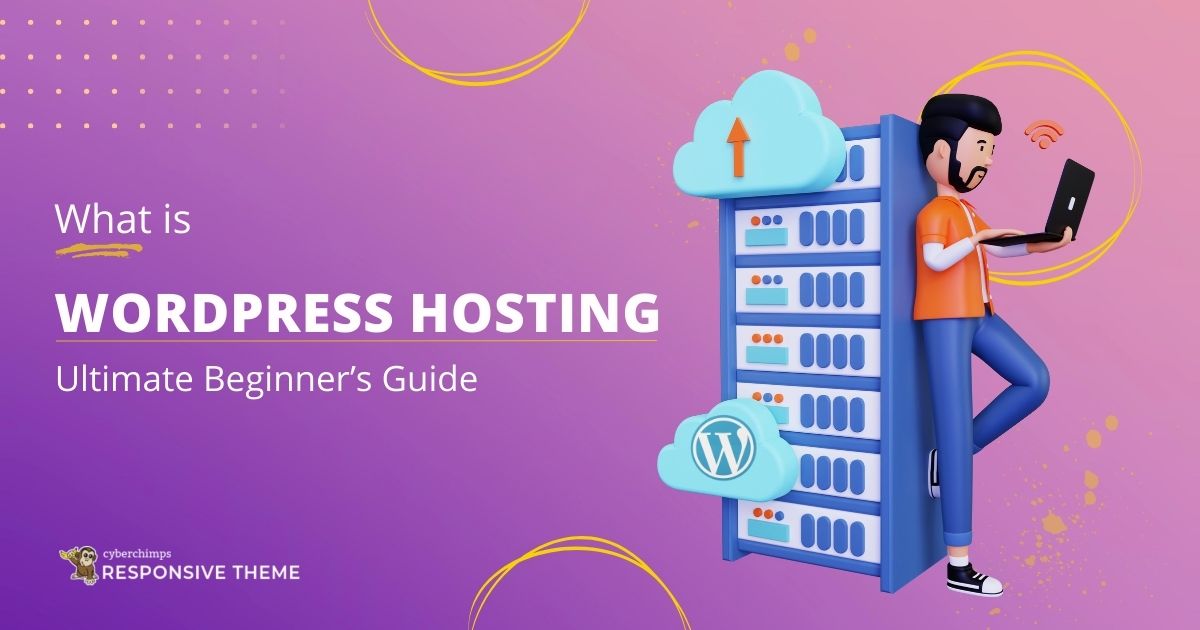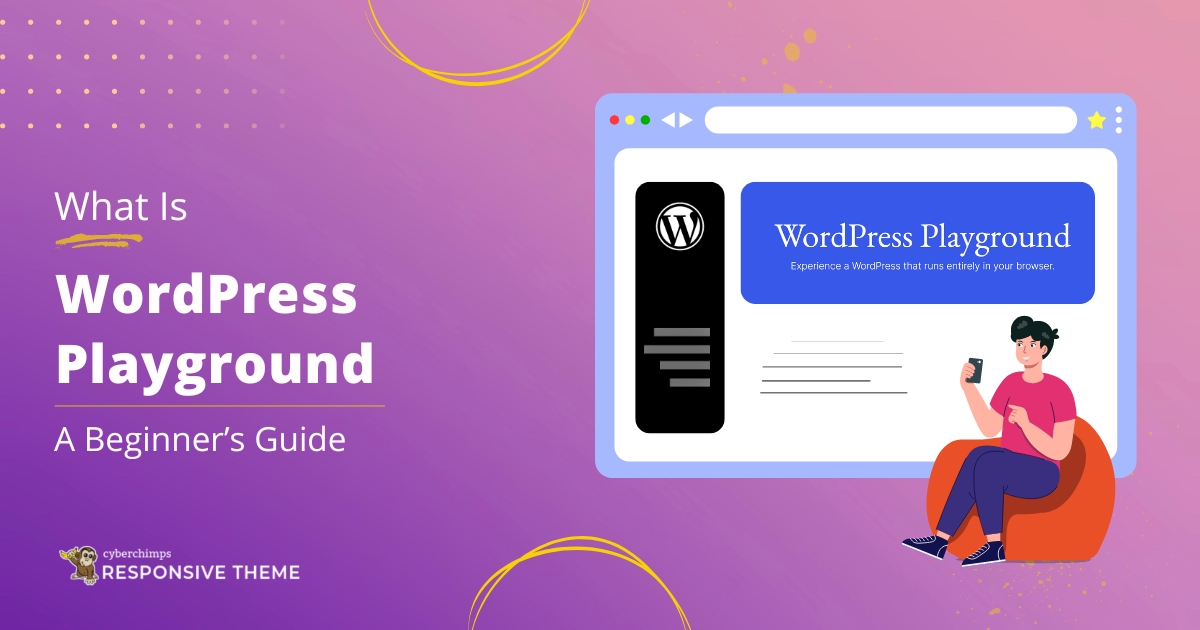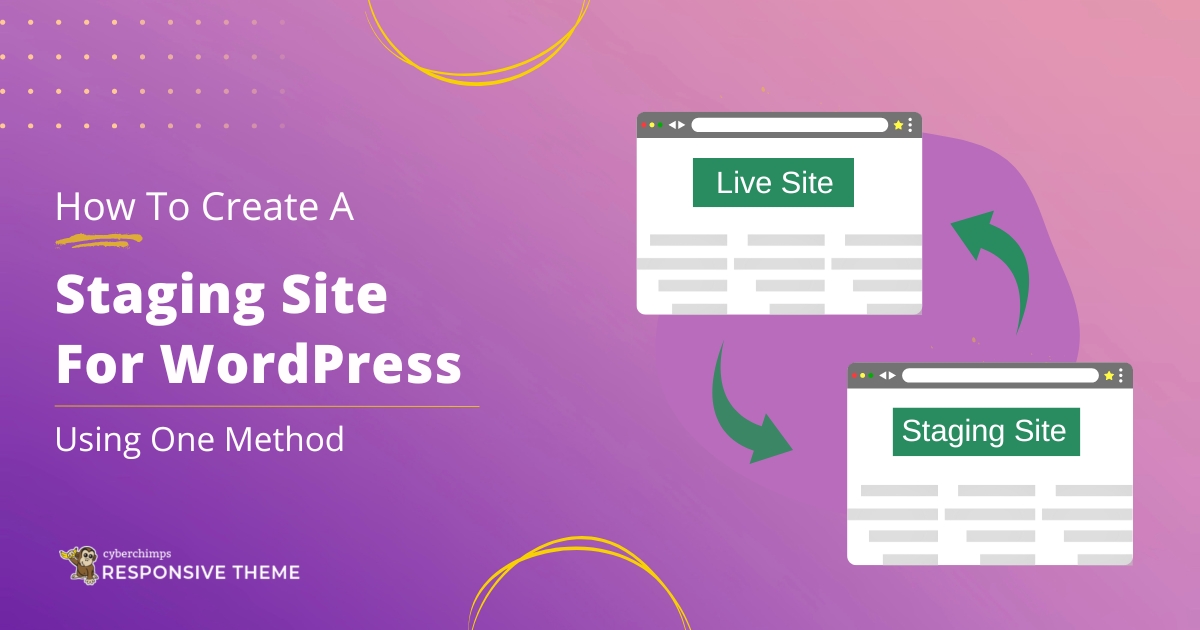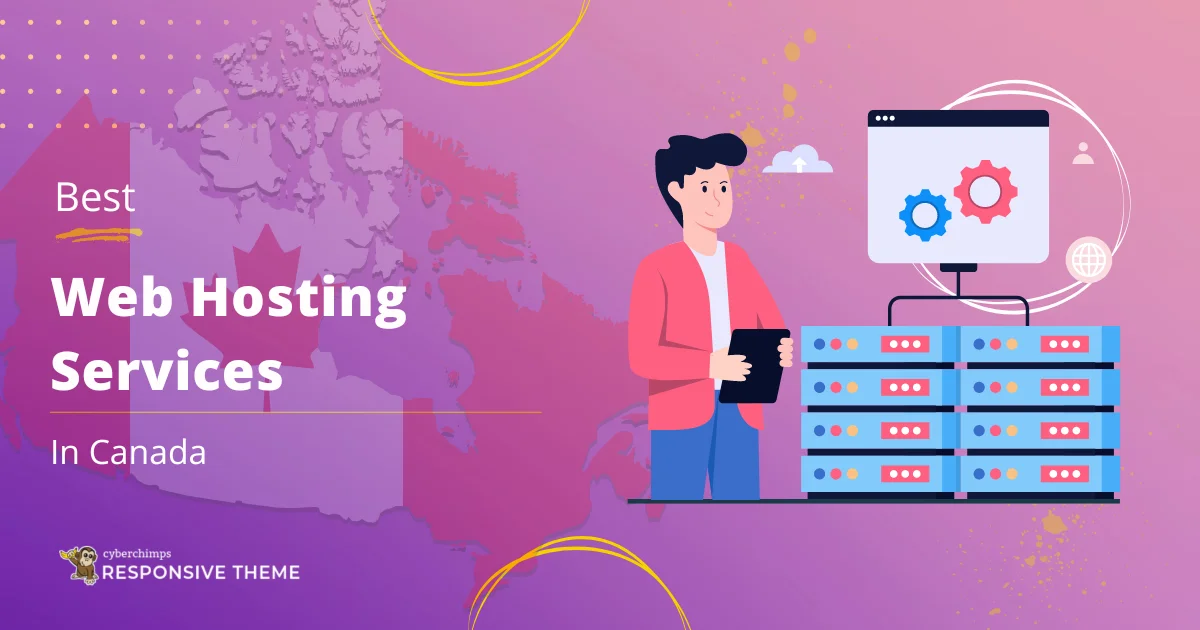You’ve probably heard the term, WordPress hosting. But what does it mean?
Hosting provides a platform to make your website accessible online. It uses resources like server space, network bandwidth, and other essential technologies to gain visibility on the internet.
Businesses can now use the internet to reach audiences worldwide, boost engagement, and raise brand awareness. This helps them create a digital footprint and increase visibility.
However, the success factor of a website depends on the hosting provider you use. Choosing a poor hosting provider can lead to several disadvantages.
So here in this article, let’s understand what is WordPress hosting and how it affects your website.
What is Web Hosting?
Web hosting is a service that provides you with storage facilities required to create and maintain a website on the World Wide Web.
When you create a website, digital content like images, videos, text, and others must be stored on a server connected to the internet. This enables users to access your website anytime.
In short, web hosting is the process of renting and managing a server for your website.
The servers are maintained by companies known as web hosting providers, equipped with the best networking infrastructure and technologies.
Every website has unique needs and goals that determine the type of hosting required. This can vary from basic shared hosting for small websites to more advanced options for larger sites.
What is WordPress Hosting?
As you’re already aware that WordPress is a Content Management System (CMS) that provides a platform to build and manage websites.
WordPress hosting is a specially designed hosting service tailored to meet the unique requirements of WordPress, thereby helping you create a high-quality website.
Using WordPress hosting provides you with faster load times, better resource allocation, and improved overall performance.
Types of WordPress Hosting
There are various hosting options available based on your needs and budget. Each option offers different levels of control, performance, and scalability.
Here are the different types of hosting services:
- Shared Hosting: Ideal for small websites with low traffic.
- VPS Hosting: Suitable for medium-sized websites.
- Dedicated Hosting: Best for large websites or applications with high traffic.
Now, let’s look at each one in detail.
1. Shared Hosting
Shared Hosting is a popular web hosting solution for beginners. Here, multiple websites share resources on a single server.
In this hosting environment, many websites are hosted on a single server. Therefore, they all share the server power, storage space, bandwidth, and other server resources. Each website has its own allocated resources, but they all coexist on the same server. Hence, we call this shared hosting.
Key Features of Shared Hosting
- Cost-Effective: Shared hosting is among the most affordable hosting options for individuals and small businesses.
- Pre-installed Software: Usually, shared hosting comes with one-click installations of popular CMS like WordPress and Drupal.
Limitations of Shared Hosting
- Limited Resources: If one website experiences a sudden traffic spike, it will affect the performance of other websites on the shared server.
- Security Concerns: A security breach or malware on one site can potentially harm all other sites since multiple websites are shared on a single server.
2. Virtual Private Server Hosting (VPS)
VPS Hosting is a popular hosting where a physical server is divided into multiple virtual servers that operate independently. Each server has dedicated CPU, RAM, storage, and bandwidth.
Key Features of VPS Hosting:
- Scalability: VPS hosting allows you to adjust your server resources as your website grows and expands. You can upgrade your VPS plan on the go to support unexpected traffic without downtime.
- Reliability: This hosting offers higher uptime and reliability than shared hosting. The dedicated resources help to keep the platform stable during traffic spikes.
Limitations of VPS Hosting:
- Resource Limits: The server has resource limits based on the plan you choose. Your website may experience performance issues if it consistently exceeds these limits.
- Technical Expertise: Managing a VPS server requires server administration, software installation, and maintenance knowledge.
3. Dedicated Hosting
Dedicated hosting service has an entire physical server where resources like processing power, storage, memory, and bandwidth are allocated to a single user or website. Moreover, this server is not shared with any other users or websites.
Features of Dedicated Hosting:
- High Performance: You get excellent performance with an entire server at your disposal. This means faster loading times, better handling of traffic spikes, and smoother operations for intensive applications.
- Complete Control: With a dedicated server, you gain full access to server configurations, installations, and security settings.
- Enhanced Security: You can add custom security measures, firewalls, and access controls to protect your data and applications. With this, you also get SSL certificates and certain SEO advantages.
Limitations of Dedicated Hosting:
- Cost: Dedicated hosting is the most expensive service when compared with other hosting services. The cost of maintaining this server can be an important factor for small businesses and startups.
- Resource Allocation: You must plan proper resource allocation to avoid overpaying for unused resources or facing resource shortages during traffic spikes.
Web hosting service depends on a website’s specific needs and goals.
You have to choose a hosting service in alignment with your website’s reputation. Hosting can vary depending on the size of your website.
Things to Look For in a Hosting Provider
In today’s digital world, performance, security, and reliability are essential pillars for the success of a website. That is why your hosting provider can make or break your digital run. With a multitude of options available, it’s crucial to select the right host.
For the same reason, let’s look at the factors that help in choosing the best hosting provider.
1. Performance
Server performance directly impacts the overall user experience, website functionality, and search engine rankings. Increased traffic and concurrent requests can overload a server, leading to slower response times.
Powerful hardware can handle a higher volume of requests and data processing, thus making your website fast and seamless.
Check specifications with your server provider for components like CPU, RAM, storage drives (HDDs or SSDs), and network infrastructure. Overall, these components are responsible for the server’s performance.
2. Uptime
Server Uptime directly affects the accessibility of a website. Websites facing frequent downtime can harm search engine rankings and lose potential business opportunities.
Choose a service provider with a reputed track record offering 99.9% server uptime or more.
3. Scalability
A good hosting provider offers scaling ability to handle increased demands and traffic without sacrificing performance or causing downtime.
Prioritize providers who can allocate additional resources like CPU, RAM, and storage on-demand.
4. Security
A hosting provider with good security measures can prevent unauthorized access, data breaches, information theft, and other virtual attacks.
Therefore, identify a hosting provider that covers total security features like malware protection, SSL certificates, firewalls, and intrusion detection.
5. Caching
Caching helps to speed up page loading time and reduces server load. It stores static copies of the web page, images, and other elements on the server or in a content delivery network (CDN). When a user requests a cached page, the server delivers it faster than building it from scratch.
Ensure your service provider supports full-page caching. Additionally, select a host that offers caching mechanisms like page caching and object caching. This allows you to fine-tune your website’s performance.
Sometimes, clearing cache is considered to be a great practice when you’re running a website.
6. Backups
Backups are the reserved copies of your website’s data. This includes files, databases, and configuration files. In any event of data loss, hacking, or server issues, you can restore your website to its previous working state.
Backups can significantly reduce downtime, so choose a host that can provide regular automatic backups with a reasonable retention period and ease of restoration.
7. Free Migrations
Website migration is transferring a website from one domain or hosting platform to another. The website’s files, databases, and configurations are moved from the old hosting server to a new one.
Website migration is a complex and delicate process. Therefore, the hosting service must help prevent data loss and minimize website downtime during the transfer.
Moreover, a good host offers a variety of migration methods, including manual transfers or automated tools.
8. Staging
Staging is creating a testing environment, a live replica of your website, that allows you to test and review changes to your site. You can check or test any modifications in a controlled environment before implementing them on your live site. This helps you reduce the risk of errors and downtime.
Ensure the staging feature is included in your hosting plan so developers can implement and test security measures and updates without harming the live site.
9. Customer Support
Hosting-related problems can directly impact a website’s performance and functionality.
When you face any issues, whether it’s a server error, downtime, or any technical issue, knowledgeable and responsible customer support can help with problem-solving.
The customer support team should have multiple ways to contact them, such as live chat, email, phone, and a ticketing system. Overall, this can help reduce downtime and frustration.
10. Costing
Ensure your hosting provider is transparent about their pricing structure. Check out pricing and revival plans and look for hidden fees or extra charges.
Compare pricing plans, but also consider the value provided (e.g., features, performance, support). Be cautious of cheap hosting, as it may come with limitations.
Check if the host offers a money-back guarantee if you’re unsatisfied with their service. Also, if you’re looking for a free hosting provider, there are multiple options to choose from.
Recommended: Why WordPress development will never stop.
Recommended WordPress Hosting Providers
With countless options available, finding a hosting partner that meets your technical requirements and aligns with your website’s goals is essential.
We recommend checking out the following list, curated for reliability, performance, and exceptional support.
1. Bluehost

Bluehost offers various web hosting services, including VPS, shared, dedicated, and WordPress hosting. With its low introductory prices and long-standing relationship with WordPress, Bluehost has become one of the market’s most reputed web hosting companies.
Furthermore, Bluehost is one of the top hosting providers recognised by many leading tech companies
Key features:
- WordPress-Friendly Environment: Bluehost is optimized for WordPress, meaning you can expect compatibility and optimal performance from the hosting provider.
- Performance and Reliability: Due to a strong emphasis on server performance, they provide competitive loading times and a high level of uptime reliability.
Limitations:
Check out the complete Bluehost Hosting review for more details.
2. Kinsta

Kinsta is a premium managed WordPress hosting provider focusing on performance and security. Although it’s on the higher end of the price spectrum, it offers powerful all-around features for all its users.
Key Features:
- Exceptional Performance: The hosting infrastructure is built on the Google Cloud Platform, which provides a high-speed and globally distributed network that loads quickly and delivers an excellent user experience.
- Expert Support: Kinsta has a reputation for offering top-notch customer support. Furthermore, their trained support team can easily assist with hosting-related questions and issues.
Limitations:
Check out the complete review for Kinsta Hosting.
3. Siteground

SiteGround is a hosting provider recognized for its WordPress compatibility and excellent customer support. As a result, their performance and server speed can benefit WordPress users seeking a smooth website-building experience.
Key Features:
- Managed WordPress Hosting: SiteGround offers managed WordPress hosting plans with features specifically designed to improve the performance and security of your websites.
- Performance Optimization: Using solid-state drives (SSDs) for faster data access, SiteGround significantly increases the performance of high-powered websites.
Limitations:
Selecting the right WordPress hosting service can significantly impact your website’s performance and user experience. Consider your specific needs and objectives when selecting a hosting provider and plan to ensure a seamless WordPress experience.
The hosting providers listed above offer a range of solutions to cater to your specific needs. Overall, remember that the ideal host may vary depending on your website’s size, traffic, and objectives.
FAQ
WordPress hosting is a specialized hosting service built to meet WordPress’s technical requirements and performance needs. Overall, it makes it easier to create, manage, and maintain WordPress-powered websites.
WordPress hosting is highly recommended to maximize your site’s performance and security. Compared to regular hosting, WordPress hosting comes with features and capabilities to help your website grow and rank easier.
Yes, WordPress hosting can be suitable for eCommerce websites. In addition, WordPress hosting providers offer WooCommerce integration and other eCommerce features to support online stores.
You can migrate your existing WordPress site to a WordPress hosting plan. Most hosting providers offer migration tools or services to help you transfer your website seamlessly.
Final Takeaway – Which WordPress Hosting is Better?
Choosing a reliable WordPress host is essential for a fast, secure, and reliable website.
The success factor of a website depends on the hosting provider. The right host will help you optimize your WordPress visibility and reach.
Are you still in a dilemma to choose the best hosting provider?
We recommend using Bluehost for its affordability, reliable uptime, and 24/7 support and its compatibility with popular themes like Responsive theme.
As technology evolves, staying informed about the latest hosting trends and best practices will empower you to maximize your WordPress-powered digital endeavors.
If you’ve liked reading this article, check our similar articles:
- Best WooCommerce Hosting Providers For Managing Your Website
- Best WordPress Hosting for Elementor
- WordPress.Com Vs WordPress.Org – Ultimate Comparison
Grab the Responsive Theme now and start building your dream website!




